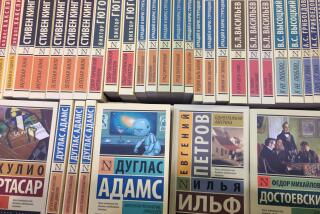THE FINAL CURTAIN : Epilogue: Finding Meaning in the Chaos
MOSCOW â At the end, so little was left of the Soviet Union that even its ministers joked about its flimsiness. âYou see, weâre now like a Hollywood Western,â the last minister of culture, Nikolai Gubenko, remarked. âMain Street is full of wonderful storefronts, but there is nothing behind them.â
Never in history had an empire disintegrated so quickly, so completely. In a matter of weeks following last Augustâs coup attempt, the Communist Party was outlawed, socialism abandoned and, finally, the second-mightiest state in world history dissolved.
The failure of Soviet socialism, which rotted from within, discredits a political-economic system that for most of the time since the Bolsheviks came to power in 1917 was largely on the advance. Successes here--both real and counterfeit--won adherents around the world for the systemâs ability to mobilize a nation. By the time the Soviet state went into its death throes, however, most of Moscowâs original disciples had already forsaken socialism as too costly; only China, Cuba, North Korea and Vietnam remain.
Yet the current, clucking condemnations neglect another legacy--the wide impact of socialist thought in the West, where capitalist systems strove to meet the challenges of social justice and human needs lest the Communists gain a foothold.
The Soviet failure presages a further swing away from statism, from government efforts at social engineering, from the belief that self-proclaimed elites should lead. Communism had been the 20th Centuryâs most influential effort to impose a utopian, but totalitarian, ideology on a complex human society. Its ultimate failure reinforces the global trend toward democracy, economic pragmatism, private enterprise and respect for the individual and human rights. For socialismâs defeat here was the peopleâs triumph.
Russia, returning to its role as a great European power, may still set benchmarks. Surging nationalism will become the political dynamic for itself and other former Soviet republics, and the spirituality of Russian Orthodoxy will replace the barrenness of Marxism-Leninism.
But all this, curiously, leaves the world ideologically adrift. For the past 50 or 60 years, the Soviet Union was a foundation stone in the way everyone thought--people were âforâ or âagainstâ socialism and many other issues on the basis of what the Soviet Union had done.
Now, they will be challenged to reach new judgments.
More to Read
Sign up for Essential California
The most important California stories and recommendations in your inbox every morning.
You may occasionally receive promotional content from the Los Angeles Times.










